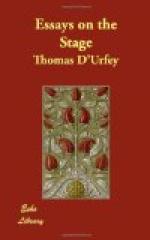indeed Sancho’s Poet, my self, must be
corrected for it, tho the Phrase be Moral, and no
more than an honest truth: But come, since it
must be so, let me ask the doctor why he does not shew
me an example for this himself, and Practice better
before he Accuses; for let the Reader look into his
Desertion Discuss’d (for he shall find
that I have trac’d him through all his Writings),
and page the 3d you will find him, I think, somewhat
more guilty of this fault than I have been, for there
you’ll see he insolently affirms, That the
Succession cannot be interrupted by an Act of Parliament,
especially when the Royal Assent is given by a King
de Facto_, and not de Jure. [Footnote:
Desertion Discuss’d, Anno 1688.] And
again; tho this next is hinted covertly, with the
meaning disguis’d, yet Sir William Temple
in his Memoirs, page 295, and the aforesaid Vindicater
of the Stage, as well as my self, have observed, that
the Absolver in the first Volume of his Essays,
page 120, in his Chapter of the A... tells us,
Whether the honesty or dishonesty are discernable
in the face, is a question which admits of dispute;
King Charles_ the Second thought he could depend
upon these Observations, but with submission, I believe
an instance might be given, in which his Rules of
Physiognomy fail’d_ [Footnote: Essays,
p.120.]. Now I’m sure the first is insolently
plain, and the next shews enough to let us into his
meaning; which granted, I think I may say, he ought
to be less bold with his Superiors too, and not give
himself the liberty to treat at this rate, not only
a Solemn, but a Royal Character. Well,
the next is, I, (naming me) take care to tell ye, that
Sancho is a dry shrewd Countryfellow
in his Character, because he blunders out Proverbs
upon all occasions, tho never so far from the purpose—and
merrily drolls upon me for making blundering and talking
nothing to the purpose, an argument of shrewdness—Why
truly, I must confess to the Doctor, there is no great
matter in that Argument, and not much whither there
be or no—But, as unperforming as I am, I
fancy I shall find as great a Blunder in his performance
presently— We ought to be just in our
Looks, as well as in our Actions, says he in his
Essays, for the mind may be declar’d one way
no less than the other: A man might as good break
his Word as his Face, especially upon some Critical
occasions [Footnote: Essays p. 118.].
Now what he means by a mans breaking his Face there,
unless he is to run his Nose against a Post, I can’t
imagine; and therefore will set it down for a Blunder—And
so there’s Tit for Tat, and the Dice in my hand
still. But poor Sancho is horribly unfortunate
agen, for by and by he catches him answering the Curate,
who threatens him for calling him Finisher of Fornication,
and Conjunction Copulative, with Excommunication,
I care not if you do, says Sancho, I shall lose




